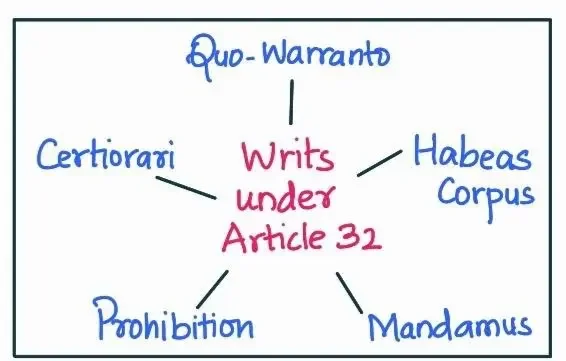![]() March 27, 2024
March 27, 2024
![]() 13032
13032
![]() 0
0
Article 32 of the Indian Constitution embodies the Right to Constitutional Remedies, often regarded as the “heart and soul” of the Constitution. This provision serves as a safeguard against the infringement of fundamental rights by the state or any other entity. Article 32 ensures that individuals have access to an effective legal remedy to seek justice and protection against violations of their rights, thereby upholding the rule of law and ensuring the supremacy of the Constitution.

| Types of Writs | Scope |
| Habeas
Corpus |
Meaning: “To have the body of”.
|
| Mandamus | Meaning: “we command” – Direct activity.
|
| Prohibition | Meaning: “to forbid”- Directs inactivity
|
| Certiorari | Meaning: ‘To be certified’ or ‘to be informed’.
|
| Quo
Warranto |
Meaning: “By what authority or warrant”.
|
| Supreme Court (SC) | High Court (HC) |
| Narrower Jurisdiction: Can issue writs only for the enforcement of Fundamental Rights. | Wider Jurisdiction: can issue writs not only for the enforcement of Fundamental Rights but also for “any other purpose” (Ordinary legal rights). |
| Wider Territorial Limitation: SC can issue writs against a person or government throughout the territory of India. | Narrower Territorial Limitation: HC can issue writs against a person residing or against a govt or authority located within its territorial jurisdiction only or outside only if, the cause of action arises within its territorial jurisdiction. |
| Mandatory: Remedy under Article 32 is in itself a Fundamental Right, SC may not refuse to exercise its writ jurisdiction. | Discretionary: Remedy under Article 226 is discretionary, HC may refuse to exercise its writ jurisdiction. |
| Must Read | |
| NCERT Notes For UPSC | UPSC Daily Current Affairs |
| UPSC Blogs | UPSC Daily Editorials |
| Daily Current Affairs Quiz | Daily Main Answer Writing |
Conclusion
<div class="new-fform">
</div>
Latest Comments